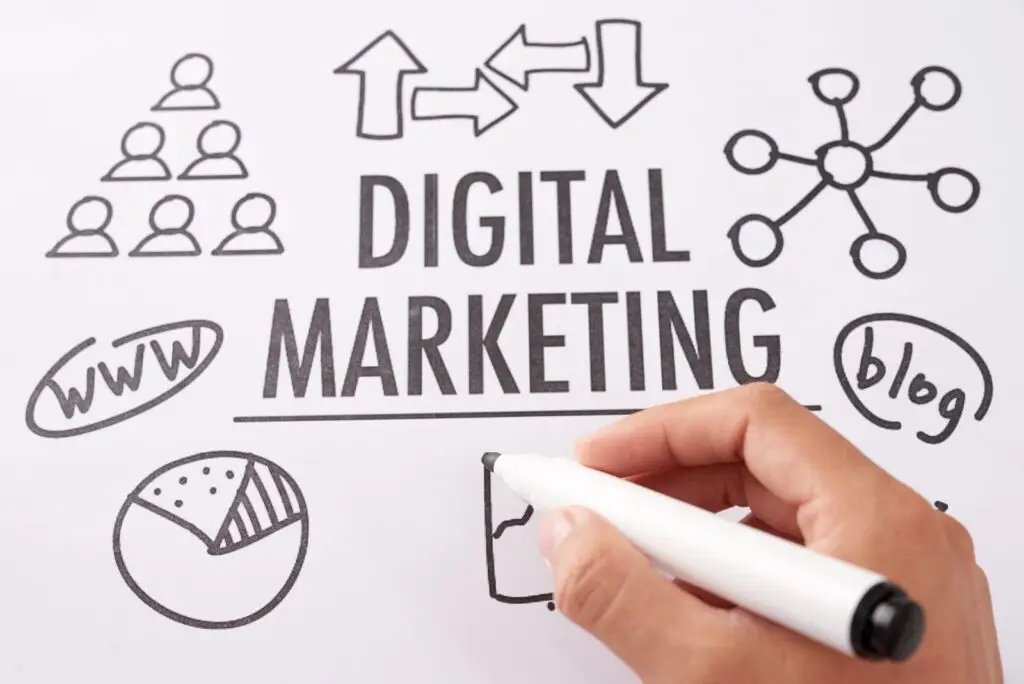
Table of Contents
Whether starting a new business or having a century-old brand, you cannot ignore digital marketing anymore. In today’s world businesses are built on digital foundation. Even before starting a business, people search for the domain and do the necessary digital transformation. Digital marketing and search engine optimization (SEO) are two powerful tools that can significantly enhance your visibility, drive traffic, and ultimately increase conversions. In this blog, we’ll explore what digital marketing is, why it’s essential, and how SEO plays a key role in your overall strategy.
What is Digital Marketing?
Digital marketing has all marketing efforts that use the internet as a medium to connect with the consumers and prospects. It includes a variety of channels and tactics designed to reach and engage your target audience online. Some of the most common forms of digital marketing include:
- Search Engine Optimization (SEO): Optimizing your website to rank higher in search engine results pages (SERPs), making it easier for potential customers to find you.
- Content Marketing: Creating and sharing valuable content, such as blogs, articles, and videos, to attract and engage your target audience.
- Social Media Marketing: Leveraging platforms like Facebook, Instagram, and Twitter to promote your brand, interact with followers, and drive traffic to your website.
- Email Marketing: Sending targeted emails to nurture leads, share updates, and promote offers.
- Pay-Per-Click (PPC) Advertising: Running paid ads on search engines and social media platforms to drive immediate traffic to your site.
- Affiliate Marketing: Partnering with affiliates, influencers and people to promote your products or services in sales commission.
Why is Digital Marketing Necessary?

In a world where consumers are increasingly turning to the internet to research products, services, and brands, digital marketing is not just an option—it’s a necessity. Here are a few reasons why:
- Broader Reach: Digital marketing allows you to reach a global audience without the geographical limitations of traditional marketing methods.
- Cost-Effectiveness: Compared to traditional marketing channels like print and TV ads, digital marketing is often more affordable, making it accessible for businesses of all sizes.
- Targeted Advertising: With digital marketing, you can precisely target your audience based on demographics, interests, and behaviour, ensuring that your message reaches the right people.
- Measurable Results: Digital marketing provides detailed analytics and metrics, allowing you to track the effectiveness of your campaigns and make data-driven decisions.
- Enhanced Engagement: Engaging with your audience through social media, email, and content marketing fosters stronger relationships and builds brand loyalty.
- Competitive Advantage: A well-executed digital marketing strategy can give you a significant edge over competitors who may not be leveraging these tools effectively.
The Role of SEO in Digital Marketing
Search Engine Optimization (SEO) is a critical component of digital marketing that focuses on improving your website’s visibility in search engine results. Here’s why SEO is essential:
- Increased Visibility: SEO helps your website rank higher in search results, making it more likely that users will find you when searching for relevant keywords.
- Organic Traffic: By optimizing your site for search engines, you can attract high-quality organic traffic, which is often more cost-effective than paid advertising.
- User Experience: Good SEO practices improve your website’s overall user experience, including faster load times, mobile-friendliness, and easy navigation, which can lead to higher engagement and conversions.
- Credibility and Trust: Websites that rank higher in search results are often perceived as more credible and trustworthy by users.
- Competitive Edge: Effective SEO can help you outperform competitors in search rankings, driving more traffic to your site and increasing your market share.
Key SEO Strategies to Implement
- Keyword Research: Identify relevant keywords and phrases that your target audience is searching for and incorporate them into your website content.
- On-Page Optimization: Optimize your website’s title tags, meta descriptions, header tags, and content to improve search engine visibility.
- Quality Content: Create high-quality, unique valuable content that fulfils the intent of the user. If someone wants to purchase a product, your content must be a guide to them
- Link Building: Site authority is important to boost your site’s authority and search engine ranking and it can be achieved by having some authoritative web links connecting your site.
- Technical SEO: Ensure that your website is technically sound, including fast load times, mobile optimization, and a clear site structure.
- Local SEO: Optimize your website for local search queries to attract customers in your geographical area.
If you feel without having a digital-first strategy your brand will succeed, it’s impossible. You should get to see the recent success stories. All brands are built on the foundation of a digital-first marketing strategy and built on SEO. Whether you’re just starting out or looking to refine your existing strategy, focusing on these areas will help you stay competitive in the ever-evolving digital landscape. At Digitarctica, we help the brand achieve milestones faster with digital marketing initiatives and experiences.